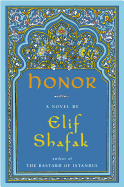
Elif Shafak's Honor is not a whodunit--the reader learns who the killer is in the first chapter--but a whydunit that dramatizes the cultural pressure and family dysfunction that might compel an Anglo-Turkish teenager in 1978 London to execute an ancient ritual. Light on gore and rich in psychological complexity, the novel presents an intricate pattern of events (with a dash or two of kismet) to show how a practice as heinous as honor killing could persist across generations and in spite of assimilation.
Shafak (The Bastard of Istanbul) frames Honor as a memoir by the killer's sister, who juxtaposes recent events in London with family history dating back to her grandparents' era in rural Anatolia. It's a fascinating portrayal of the misalignment that occurs when constructs from the old country, such as arranged marriage and the maternal favoritism for a firstborn son, are exposed to a more open and egalitarian culture.
Shafak gives her characters enough singular motivation to prevent Honor's fictional component from being overwhelmed by its message, and she creates an impressive number of rounded individuals. Two outstanding characters are Pembe Kader and Jamila Yeter, twins whose destinies form the backbone of the novel. The scenes of Pembe's struggles as a single mother in London and Jamila's precarious existence as the "Virgin Midwife" in a cabin near the Euphrates River would be worth reading independent from the novel's central theme.
In Honor, Shafak gives us a novel that manages to be diverting and full of life while simultaneously analyzing the durability of violent cultural traditions. --Holloway McCandless

